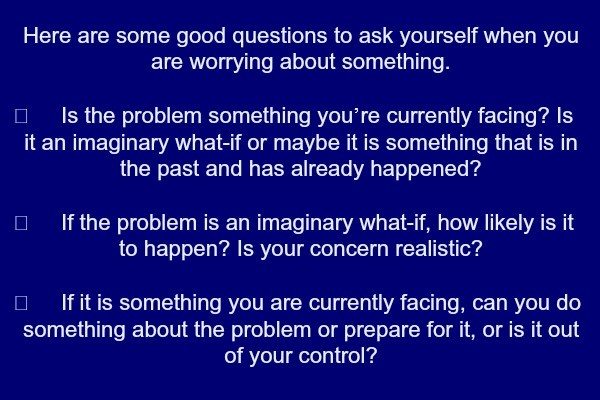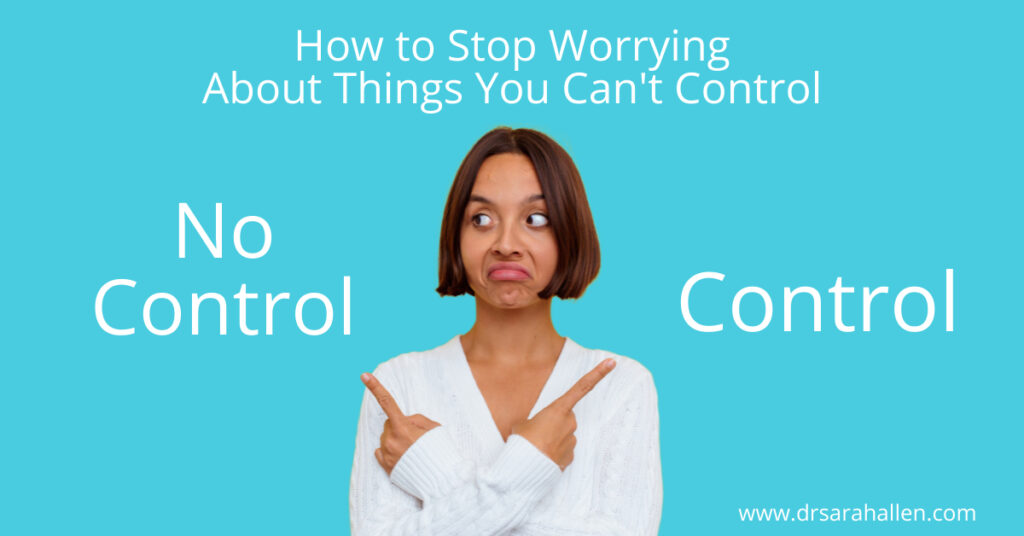
So Why Do We Worry About Things?
Worries bother us. We can’t sleep or concentrate because we have pessimistic thoughts going round and around in our head, but in a way, worries make sense as they pull us in to a false sense of feeling in control. We’re doing something, even if it is just worrying.
You continue to worry because our mind thinks:
• Maybe I’ll find a solution.
• I don’t want to overlook anything.
• If I keep thinking a little longer, maybe I’ll figure it out.
• I don’t want to be surprised. If I consider all the possible outcomes I’ll be more in control when something bad happens.

We can have a hard time giving up on our worries because, in a sense, our worries have been working for us.
So now I’ve pointed that out, let’s just stop worrying then! Unfortunately, telling yourself to stop worrying doesn’t work for long. You can distract yourself or suppress the thoughts, but they keep popping back up.
Instead I would like you to distinguish between whether your worry is solvable or not.
This is the number 1 question to ask yourself is – “Is this a situation I have control over vs I have no control over?”
Learning To Accept Difficult Feelings When Worry Is Not Solvable

If the problem is in the past then you have to decide whether to say something to the person involved or do nothing and accept what happened. If the worry isn’t something you can solve, you have to do nothing and practice acceptance. That doesn’t mean it doesn’t feel bad though. In such cases, it’s important to tune into your emotions. Your brain is so busy going over and over pretend conversations with the person that caused the hurt that it gives a temporary sense of control that something is being done. But it’s not really allowing you to get over it and it doesn’t allow you time to feel.
The only way out of this is by embracing your feelings. Sometimes we just can’t control events and we have to embrace uncertainty. Sometimes we are hurt and angry but there is nothing that can be done, but feel our emotions. You are in control. You are deciding to feel your feelings so you can eventually let it go.
What to Do When the Worry Is Solvable
If the worry is solvable we can use Active Worrying. This is where worrying serves a purpose. For example we worry about a deadline at work and that motivates us to get the project done.

It is really important to differentiate between a worry that can be solved and one that we can’t do anything about.
Active worrying involves brainstorming ideas about all the possible solutions you can think of (try not to get hung up on finding a perfect solution though) and then make a plan that focuses on things you have the power to change.
Once you have a plan of action and start doing something about the problem, you’ll feel much less worried.
This technique is also very useful when you are stuck in an argument with someone. First identify what is the problem you are arguing about. Then brainstorm all the things you can possible do about the problem and the likely outcomes and then make a joint plan of action.
If you would like to see a video I made that talks about these tips please check out The Best Question To Reduce Worrying & Anxiety Video

If you would like to see a video I made that talks about these tips please check out The Best Question To Reduce Worrying & Anxiety Video
If you feel ready to start working on reducing your anxiety but need support, I can help you overcome worrying in one-on-one individual counseling sessions.
In a supportive environment with a therapist who has over 25 years experience you can learn how to reduce worrying by:
- Learning a variety of relaxation and breathing strategies which can help you reduce your overall levels of stress and help you face anxiety-provoking situations.
- Learning how to distinguish between worries that require your attention and worries that are unnecessary.
- Learning skills to manage anxious thoughts and to tackle fears that may have been holding you back.While all your worries won’t disappear, you will be given strategies to manage them better and tools to reduce the impact they have on your life.

If you have any questions, or would like to set up an appointment to work with me and learn how to reduce anxiety, please contact me at 847 791-7722 or on the form below.
If you would like to read more about me and my areas of specialty, please visit Dr. Sarah Allen Bio.
Dr. Allen’s professional license only allows her to work with clients who live in IL & FL & the UK and unfortunately does not allow her to give personalized advice via email to people who are not her clients.
Dr. Allen sees clients in person in her Northbrook, IL office or remotely via video or phone.

What Can I Read That Helps Me While I Am Waiting For My First Appointment With Sarah?
Download this free booklet to gain valuable insights and practical strategies for managing anxiety and worrying.




























